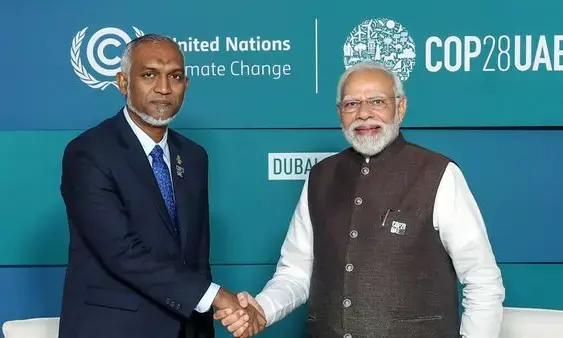Deft Handling Stops Further Slide in India-Maldives Relations
Maldives Suspends Own Ministers For Insulting Indian PM

A precipitous slide in Indo-Maldivian relations was stemmed on Sunday when the Maldivian government suspended three Deputy Ministers who had made derogatory remarks on the Indian Prime Minister Narendra Modi.
Maldives and India have been drifting apart after the pro-China Mohamad Muizzu beat the pro-Indian Ibrahim Solih in the last Presidential election. On assuming office, Muizzu asked India to take back its military personnel and began reviewing a hundred agreements his predecessor had entered into with India.
Muizzu also broke tradition by avoiding an official visit to India on taking over, and choosing to go to Turkiye instead. He is currently on a visit to China, to show where his sympathies lay.
The unwarranted remarks on Modi by Deputy Ministers Mariyam Shiuna, Abdulla Mahzoon Maajid and Malsha Shareef were made in this larger political context. They threatened to damage relations with India further.
However, the Maldivian President saw the writing on the wall. He promptly put a lid on the controversy by suspending the errant ministers.
A statement released by the Maldivian Ministry of Foreign Affairs on Sunday said that posts on social media platforms defaming foreign leaders and high-level officials “represented personal opinions and not the views of the government.”
It then went on to say that the government will not hesitate to take action against individuals who showed disrespect towards foreign leaders. Suspension orders against the trio promptly followed.
India did not escalate the conflict. It avoided comment, apparently because the Maldivians had taken corrective action.
Meanwhile, India was cool on Muizzu’s visit to China. The Indian External Affairs Ministry spokesman Randhir Jaiswal said it was for the Maldivians “to decide where they go and how they go about their international relations."
The controversy over Modi arose following his visit to Lakshadweep during which he extolled the beauty of the islands and said it should become a global tourist destination. Apparently, the three Maldivian ministers were under the impression that Modi had compared Lakshadweep with the Maldives to promote Laskshadweep to the detriment of the Maldives. But, in fact, Modi did not even mention the Maldives in his remarks.
Contrary to expectations (given the anti-Indian rhetoric and the India-Out campaign for the last five years) many Maldivians lashed out at the fulminations of their ministers.
There was a public demand for action against the ministers stating that their comments would tarnish the country's reputation and adversely affect tourist arrivals from India.
In 2023, 209,198 Indian tourists had come to the Maldives. They were the single largest country group among foreign tourists.
The Maldives Association of Travel Agents and Tour Operators (MATATO) said in a statement that efforts to develop and foster India’s Lakshadweep's tourism sector would have no adverse effect on the Maldives’ tourism industry. The association said efforts to develop and foster Lakshadweep island’s tourism sector would be complementary to Maldivian tourism, creating opportunities for both regions.
“The synergies between the two destinations can enhance the overall appeal for travellers and encourage more cruise liners to explore this vibrant and culturally rich region,” the statement read.
The MATATO emphasised the significance of fostering positive ties with all countries including the South Asian neighbours, as they believed collaborative efforts and open communication were essential for ensuring friendly relations, trade and cultural exchanges, and people to people contact between Maldives and its neighbours.
It underscored the strategic alliances it shares with numerous Indian travel associations, conveying its belief in the power of dialogue and mutual support, leveraging these connections to strengthen the ties that bind the nations’ tourism industries.
The association further said that the Indian market is pivotal to the success of the Maldivian tourism sector, supporting guest houses and small to medium-sized enterprises (SMEs) that depend on the influx of Indian visitors.
Emphasising the importance of refraining from hateful comments and calls on all parties to promote messages of unity and cooperation, MATATO encouraged all stakeholders to work towards building bridges rather than walls, fostering an environment where mutual respect and understanding thrive.
It urged stakeholders to recognize the interconnectedness of the Maldivian and Indian economies and the shared benefits that come from a harmonious relationship between the Maldives and India.
In a post on X, former Maldivian President Mohamed Nasheed, stressed that India is a key ally which Maldives needs for its security and prosperity. He singled out Deputy Minister Mariyam Shiuna and condemned her “appalling language against the leader of a key ally.”



